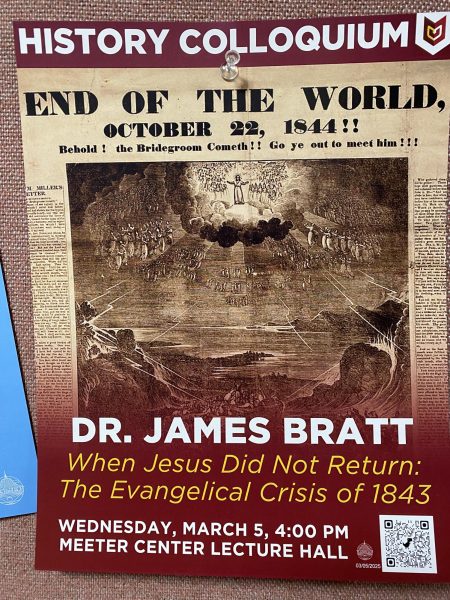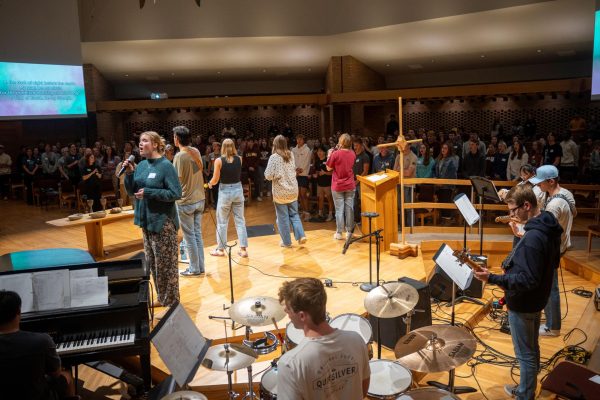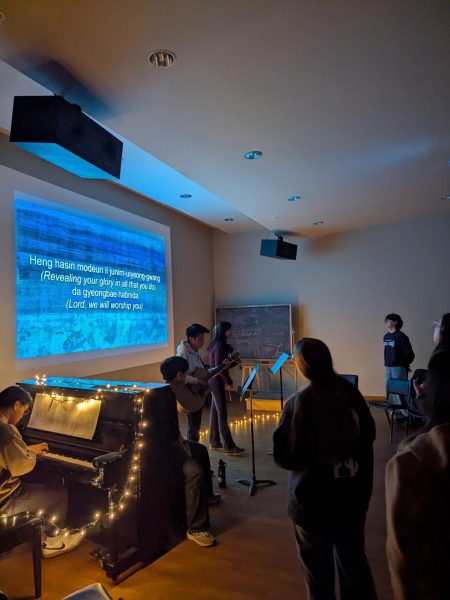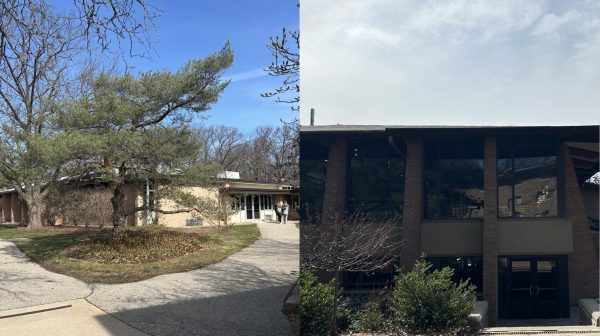Evolution debate continues amongst Christian biology profs
Decades into the faith and evolution conflict and the majority of biology professors at many Christian schools teach evolution as the best explanation for the development of life, but they teach it at a lower rate than their secular peers.
This finding comes from a survey sent by Chimes to more than 730 biology professors from the Council of Christian Colleges and Universities (CCCU), “a higher education association of more than 180 Christian institutions.” 168 responses were collected about their teachings on evolution.
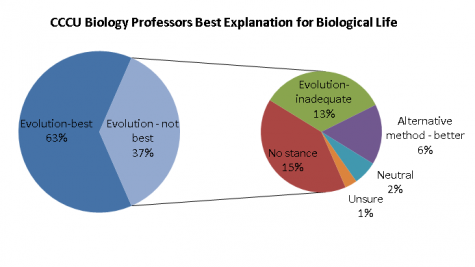
The survey revealed that only 63 percent of biology professors from CCCU institutions said they teach evolution as the best explanation for the development of biological life. This means 37 percent of professors don’t directly teach evolution.
However, only 18.45 percent of survey respondents teach that evolution is inferior to another model or is completely inadequate. The rest of those who didn’t say they teach evolution said they take a neutral stance or don’t have one at all.
The percentage of CCCU professors who support evolution resembles the general public’s support at 60 percent, according to the Pew Research Center; although, their support for evolution is significantly lower than that of most scientists. According to Pew, “Nearly all scientists (97%) say humans and other living things have evolved over time.”
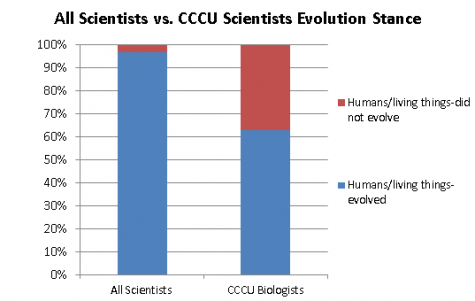
Scientific consensus aside, the council doesn’t take an official stance on evolution, according to Stan Rosenberg, the director of Scholarship and Christianity at the University of Oxford, the CCCU’s UK subsidiary. Rosenberg said “The CCCU’s role is not to be an apologist for a position … but to encourage serious conversation, research and education.” He continued, citing support from the council, “[but] I have no qualm indicating my support for Darwinian evolution.”
The council is supportive of scholarship on both sides of the debate. For instance, multiple professors from the survey sympathized with a popular alternative to evolution: young earth creationism. One professor said, “My starting point in my [biology] class is Genesis.”
This contention between Christianity and evolutionary science isn’t new.
Throughout the 1870’s, Dwight L. Moody, the founder of Moody Bible Institute, took charge against Charles Darwin and his claim from “The Descent of Man” that humans descended from apes. Moody, a household name for many evangelicals, argued Darwin’s claims “contradicted biblical truth.”
These historical disagreements may stem from the “theological problems that arise [when] the scientific evidence for evolution is accepted,” as one biology professor put it.
Another evangelical respondent cited theological dilemmas they see when evolution and the creation story meet. They exaggerated, saying, “I am conscious of the fact that evolution and Genesis are incompatible since Genesis 1 (whatever way you wish to interpret it) clearly states at least 15 times that newly created kinds reproduce after their own kind.”
The newest rendition of the debate has even put CCCU schools, such as Calvin, in the national spotlight.
In 2011, two Calvin College religion professors captured national attention with a series of interviews with NPR, MLive and other media outlets after writing articles on Christianity and human origins that, amongst many things, doubted the existence of a literal Adam and Eve in light of modern scientific understandings. Both of their articles propagate or presume evolutionary science, in particular genomic science. One of the professors, John Schneider, retired early after facing pressure from Calvin’s former president, according to two Calvin professors.
Other Christian institutions have experienced their fair share of time in the limelight as well with their dealings with evolutionary science, such as the drama at Olivet Nazarene University surrounding biologist Richard Colling and his book reconciling Christianity and evolution.
Colling isn’t alone in his affirmation of evolution. One professor even called evolution “the best idea that God ever had.”
Many respondents, although affirming the biological basis for evolution, decide to take a pastoral route in the way they teach. A Catholic respondent said, “As an educator, I must guide all those I teach to think critically and deeply so that they may best try to discover and discern what is true on their own and be steered by their own informed free will.”
In a similar manner, one evangelical respondent said, “I love my students and we are very pastoral. We do have a stance that … ‘God used a great deal of evolution in the creation of species.’ … I model respectful dialogue and never mock people I disagree with.”
Another evangelical who teaches evolution as the best explanation quotes his institution’s former president, “I want students to know they can … turn over any rock without the fear that something might jump out and eat God.”
Although these findings may be a window unto the general conflict between religion and evolution, results are limited to colleges within the council. The CCCU doesn’t represent all Christian higher-education institutions. Some schools, such as the liberal Goshen and conservative Oklahoma Wesleyan, parted with the council for decisions the organization has made regarding homosexuality, a hot button issue; their partings demonstrate how the institutions who have left have tended to view the CCCU as either too conservative or too liberal, such as The Master’s College, a conservative school, that left “given that the vast majority of member schools do not accept the Genesis account of creation or the inerrancy of Scripture.”
Some traditionally conservative Christian schools have simply never been part of the council, such as Liberty University, the institution founded by the conservative leader of the Moral Majority, Jerry Falwell. Many biology and geology professors at Liberty openly reject evolution in favor of creationism.
Many CCCU institutions, especially Bible colleges, seminaries and colleges outside the US, don’t have biology departments. In addition, although governing members in the CCCU need to be fully accredited, not all members are voting members.
No matter which side of the evolution debate the professors fell on, about 90 percent of them indicated the great importance of their Christian faith to their lives as a whole and to this topic in particular.
The CCCU’s list of requirements for its members can be found at https://www.cccu.org/institutions/. A complete list of institutions can be found at https://www.cccu.org/members_and_affiliates/.
Results were limited by email accessibility; certain institutions’ websites didn’t include emails or wouldn’t release them to Chimes.
David Fitch also contributed reporting.




